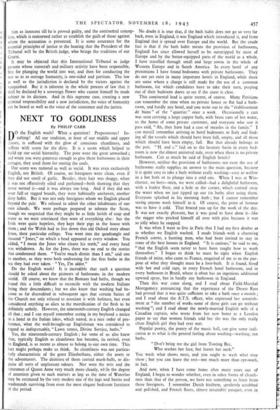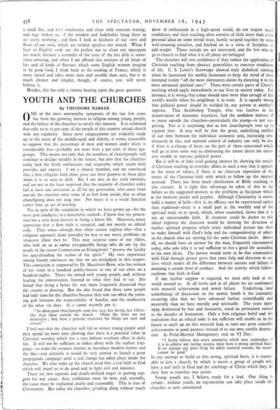NEXT TO GODLINESS
By PHILIP CARR
1)0 the English wash What a question! Preposterous! In- sulting! All our tradition, at least of our middle and upper classes, is suffused with the glow of conscious cleanliness, and stiffens with scorn for the dirty. It is a scorn which helped to build up our social hierarchy. The poor were the great unwashed ; and when you were generous enough to give them bathrooms in their cottages, they used them for storing the coals.
Our scorn was national as well as social. It was even exclusively English, not British. Of course, no foreigners were clean, even if they did not smell of garlic. Besides, their hair was shaggy, when it was not offensively oiled and perfumed—both showing that they never wetted it—and it was always too long. And if they did not wear full or ragged beards, they were habitually unshaven, another dirty habit. But it was not only foreigners whom we English placed beyond the pale. We refused to admit the other inhabitants of our own islands. We were perhaps prepared to tolerate the Scots, though we suspected that they might be as little lavish of soap and water as we were convinced they were of everything else: but the Irish were quite hopeless, they kept their pigs in the house with them ; and the Welsh had to live down that old Oxford story about Jesus, their particular college. You went into the quadrangle and shouted "Jones," on which a head appeared at every window. You added, "I mean the Jones who cleans his teeth," and every head was withdrawn. As for the Jews, there was no end to the stories that condemned them. "You're much dirtier than I am," said one to another, as they were both undressing for the first bathe in the sea they had ever taken. "Yes, I'm older."
Do the English wash? It is incredible that such a question should be asked about the pioneers of bathrooms in the modern world. Of course, we knew that the Romans had baths, though we found this a little difficult to reconcile with the modern Italians being their descendants ; but we also knew that washing had be- come so far discredited in subsequent ages that certain Saints of the Church not only refused to associate it with holiness, but even considered anything so alien to the mortification of the flesh to be definitely unholy. However, the nineteenth-century English changed all that ; and I can myself remember seeing in my boyhood a notice in a hotel in the Italian lakes, which stated, in a nice order of pre- ference, what the well-brought-up Englishman was considered to regard as indispensable, "Lawn tennis, Divine Servjce, baths."
Yes, the nineteenth-century English ; for some of us also knew that, typically English as cleanliness has become, its revival, even in England, is so recent as almost to belong to our own time. This fact might perhaps make us think, So cleanliness was not particu- larly characteristic of the great Elizabethans, either the poets or the adventurers. The daintiest of them carried musk-balls, to dis- guise all sorts of unpleasant odours. Nor were the wits and the statesmen of Queen Anne very much more cleanly, wkile the degree of attention given to such matters as late as the time of Waterloo may be estimated by the very modest size of the jugs and basins and washstands surviving from even the most elegant bedroom furniture of the period. No doubt it is true that, if the bath habit does not go so very far back, even in England, it was England which introduced it, and from England that it spread over Europe and the world. But the crude fact is that if the bath habit means the provision of bathrooms, England has since allowed herself to be outstripped by most of Europe and by the better-equipped parts of the world as a whole. I have travelled through small and large towns in the whole of Western Europe and in South America. In every hotel of any pretentions I have found bedrooms with private bathrooms. They do not yet exist in many important hotels in England, while there are some where a charge is still made for the use of a common bathroom, for which candidates have to take their turn, peeping out of their bedroom doors to see if the coast is clear.
This continental lead is quite recent, of course. Many Parisians can remember the time when no private house or flat had a bath- room, and hardly any hotel, and you went out to the " etablissement de bains " of the " quartier " once a week. Occasionally a cart was seen carrying a large copper bath, with brass cans of hot water, to the home of some private customer, and everyone who saw it pass said, " Ah, they have had a case of measles in the family." I can myself remember arriving in hotel bedrooms in Italy and find- ing all the vessels which should have been full, empty, and all those which should have been empty, full. But that already belongs to the past. "H. and c." laid on to the lavatory basin in every bed- room is now the almost universal rule, even when there is no private bathroom. Can as much be said of English hotels?
However, neither the provision of bathrooms nor even the use of bathrooms really supplies an answer to the main question, because it is quite easy to take a bath without really washing—easy to wallow in a hot bath or to plunge into a cold one. When I was at Win- chester, we boys—men, we were called—had a delightful bathroom, with a leaden floor, and a hole in the corner, which carried away the water when we just tipped up our tin baths after using them. Everyone splashed in his morning bath ; but I cannot remember seeing anyone wash himself in it. Of course, the point of honour was to have it cold. That braced you up for the work of the day. It was not exactly pleasant, but it was good to have done it—like the nigger who pricked himself all over with pins because it was so jolly when he stopped.
It was when I went to live in Paris that I had my first doubts as to whether we English washed. I made friends with a charming French comte, a hunting man, who had been invited to stay in some of the best houses in England. "It is curious," he said to me, "that the English seem never to have been taught how to wash themselves." I began to think he must be right when English friends of mine, who came to France, enquired of me as to the pur- pose of what they thought must be a foot-bath. It is found, fitted with hot and cold taps, in every French hotel bathroom, and in every bathroom in Brazil, where it often has an ingenious additional upward spray, but in hardly any bathroom in England.
Then this war came along, and I read about Field-Marshal Montgomery announcing that the experience of the 'Desert Rats had proved that it was quite sufficient to take a bath once a month ; and I read about the A.T.S. officer, who expressed her astonish- ment at "the number of weeks some of these girls can go without washing "; and I read about the newly-married English wife of a Canadian captain, who wrote from her new home to a London paper to say that women friends told her she was the only really clean English girl they had ever met.
Popular poetry, the poetry of the music hall, can give some indi- cation as to what is the general feeling about washing—washing, not baths.
"Don't bring me the girl from Tooting Bee, Who washes her face, but leaves her neck."
You wash what shows most, anà you ought to wash what may show ; but you can leave the rest—not much more than eye-wash, in fact.
And now, when I have come home after many years out of England, I begin to wonder whether, even in other forms of cleanli- ness than that of the person, we have not something to learn from. those foreigners. I remember Dutch kitchens, spotlessly scrubbed and polished, and French floors, almost invariably parquet, even in a small flat, and ken: wholesome and clean with constant waxing, and rugs shaken ou. of the window and bedclothes hung there to air every morning ; and then I look at kitchens of our own and floors of our own, which are neither spotless nor waxed. When I hear an English cook say she prefers not to clean out saucepans too much, because a reminder of the taste of the last dish is some- times amusing, and when I am offered that mixture of all kinds of fats and all kinds of flavours which some English women imagine to be good food, I think back to the cooking of France, which is more varied and takes more time and trouble than ours, but is so much cleaner and simpler, though, of course, you will never believe it.
Besides, this has only a remote bearing upon the great question.































 Previous page
Previous page